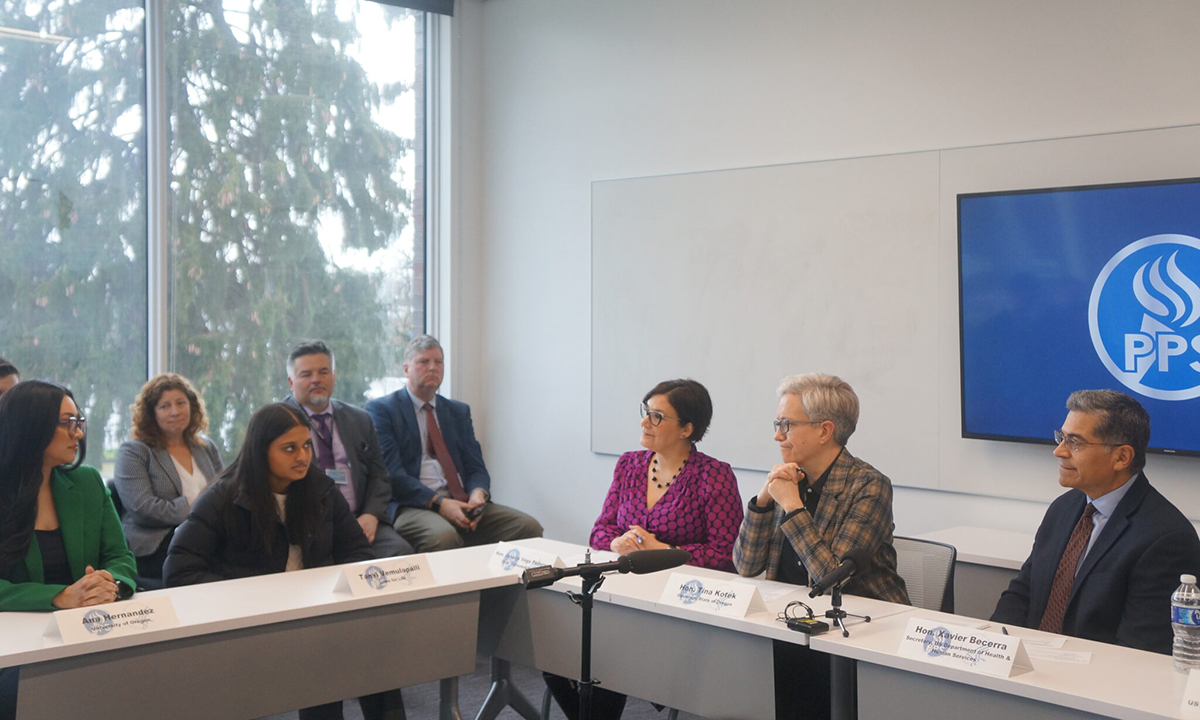Oregon Youth Tell State, Federal Leaders They Need Culturally Relevant Mental Health Care
Teens said they need access to culturally relevant mental health care and better communication about what services exist.

Get stories like these delivered straight to your inbox. Sign up for The 74 Newsletter
Teens, mental health care professionals and crisis-line volunteers told state and federal leaders that youth need access to more culturally relevant mental health care and better communication about what services exist.
Addressing these two issues would go a long way toward combating a youth mental health crisis that has grown in the wake of the pandemic, they told Gov. Tina Kotek and Xavier Becerra, secretary of the U.S. Department of Health and Human Services.
The group convened at Faubion School in northeast Portland on Monday afternoon to discuss mental health issues facing students and resources available through state and federal dollars. Also present at the K-8 school were representatives of Portland Public Schools and the University of Oregon’s new Ballmer Institute for Children’s Behavioral Health. The institute was set up to address the lack of mental health care professionals by placing its first class of 200 undergraduates into Portland Public Schools as interns in the fall of 2023.
A survey of about one-third of Oregon students conducted in 2020 by the Oregon Health Authority and the Oregon Department of Education found nearly half felt sad or hopeless for more than a two-week period. And a report released in August by the Annie E. Casey Foundation found that the number of Oregon children struggling with mental health issues grew from 11% in 2016 to 16% in 2020.
Jaiyana Jones, an eighth grader at Faubion, said during a roundtable discussion that COVID and social media have increased mental health suffering among students over the last few years. She said some who don’t feel comfortable talking with counselors and school staff turn instead to abusing substances. Tanvi Vemulapalli, a volunteer for the nonprofit crisis hotline Lines for Life, said a lack of supportive adults is the number one reason young people say they call the hotline.
“It’s one of the biggest things, the lack of comfort reaching out to someone,” Vemulapalli said.
As a Black student, Jones said it would be helpful to have more Black counselors and mental health staff. “People who share some of what you experience,” she said.
Jeida Dezurny, a member of the Confederated Tribes of Siletz Indians and a youth representative of the Northwest Portland Area Indian Health Board, said there is a generational and cultural disconnect among many Native American youth to mental health care services. In the absence of more Native mental health care providers, Dezurnby said she and her colleagues have focused on training Native adults from all walks of life to talk with young people about suicide, opioids, mental health, sex and other topics that can feel uncomfortable to discuss.
“We start teaching the caring adults, the educators, the guardians, the community members,” she said, asking them: “How do you address mental health? We know that you probably have never addressed it in your life, and that’s OK, we’re gonna get past it, we’re going to educate you.”
To combat nationwide shortages of school counselors, psychologists and social workers, Becerra said the federal human services department is planning to launch a scholarship program that would help pay for graduate studies for people hoping to become mental health care professionals. In exchange, they would need to commit to three to four years of work in the field.
Becerra also touted the federal government’s investment in the 988 Suicide and Crisis Lifeline launched in July, which connects callers and texters to counselors trained in helping people in a crisis. Becerra said the Biden administration is investing $500 million over two years to get the line established nationwide, but states will need to provide their own funding to sustain the service.
“I think it’d be a great challenge for the youth who are in this space to convince the leaders in your state – because there are only a few states today that actually provide a steady stream of money – to keep the 988 lifeline going,” he said.
In Oregon, Lines for Life oversees the service except in Marion and Polk counties, where Northwest Human Services is in charge. Kotek’s proposed budget includes adding a fee of 40 cents per cell line to sustain the 988 Lifeline into the future.
The Legislature is considering several bills to target the mental health care workforce shortage and improve access to mental health care in schools.
Two bills, House Bill 2485 and House Bill 3274, would require Portland State University and Southern Oregon University to educate and graduate more public mental health and addiction treatment providers over the next five years. House Bill 2636 would require every school district to ensure every school has a mental health professional and nurse.
In 2019, the state allocated more than $1 billion to the Student Success Act, which helped pay for mental health care in schools. Additionally, Oregon received millions from the American Rescue Plan during the pandemic, with directives to use some of it for mental health staff and programs.
Oregon Capital Chronicle is part of States Newsroom, a network of news bureaus supported by grants and a coalition of donors as a 501c(3) public charity. Oregon Capital Chronicle maintains editorial independence. Contact Editor Lynne Terry for questions: info@oregoncapitalchronicle.com. Follow Oregon Capital Chronicle on Facebook and Twitter.
Get stories like these delivered straight to your inbox. Sign up for The 74 Newsletter

;)
